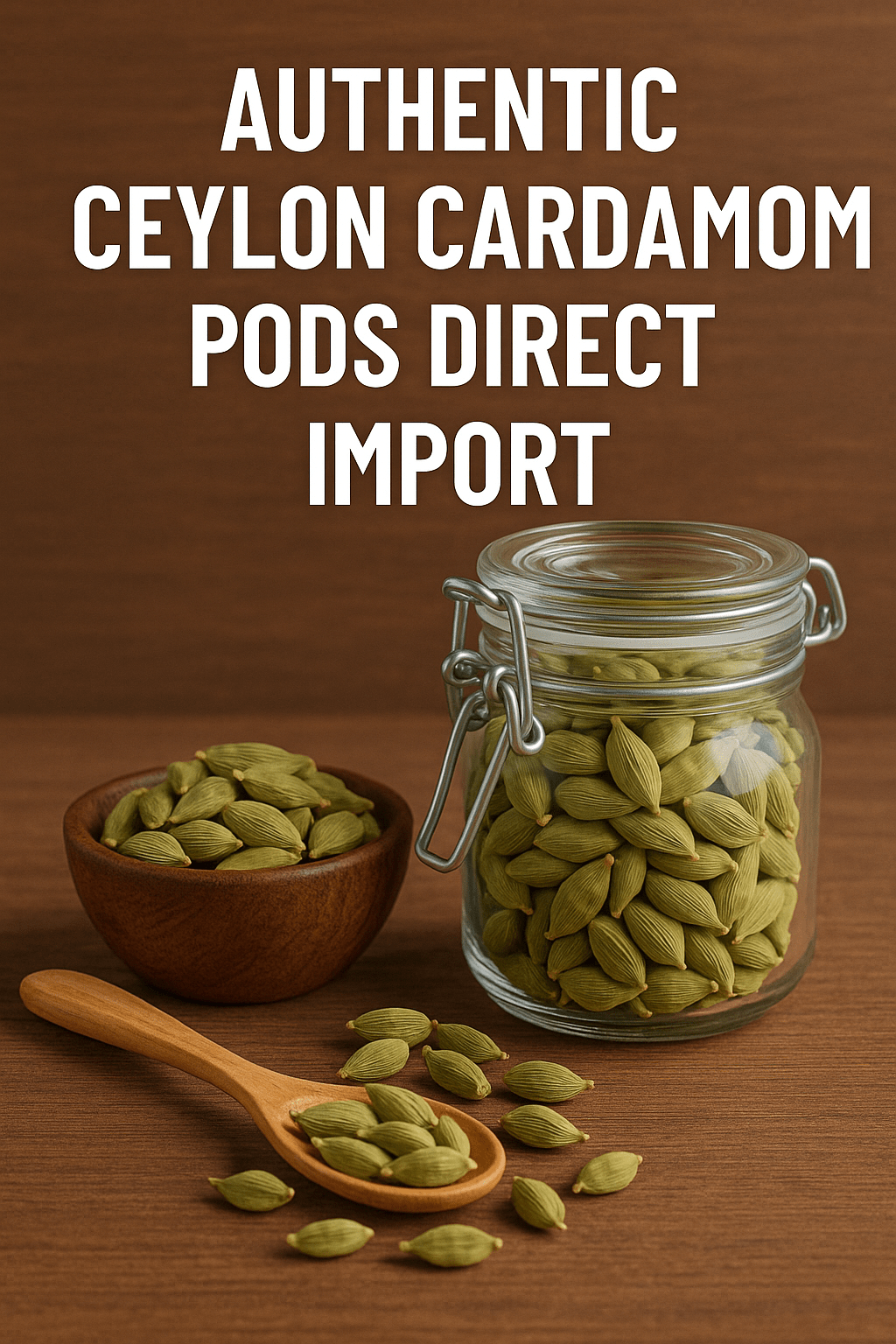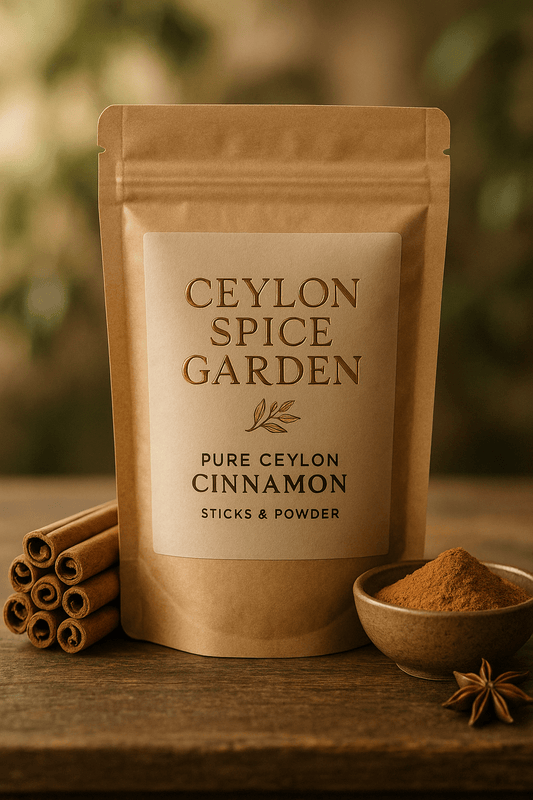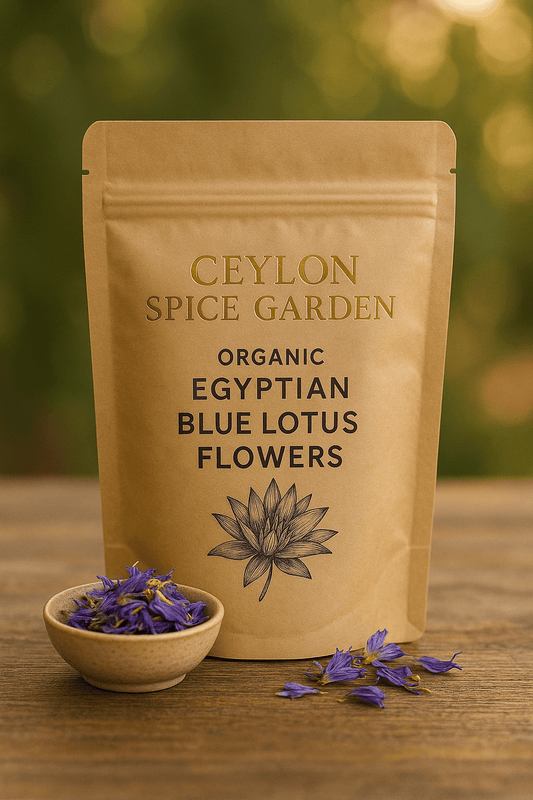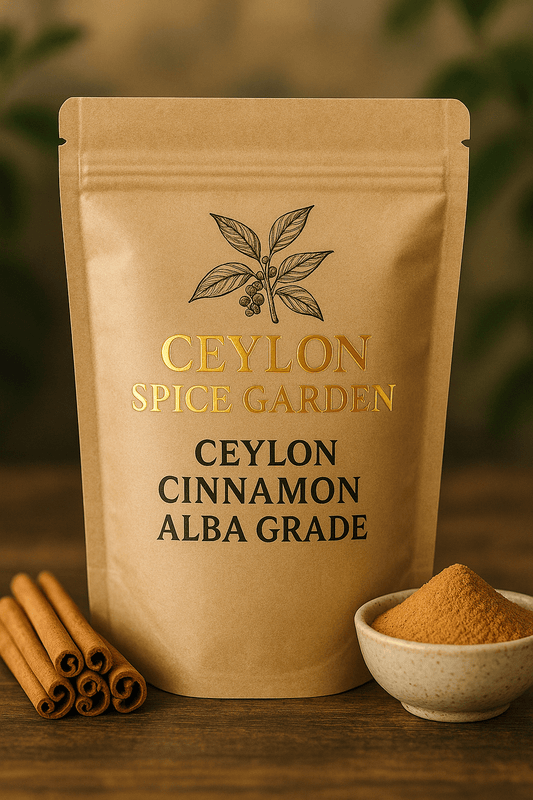
Authentic Ceylon Cardamom Pods Direct Import - Premium Quality Buyer's Guide 2025
Authentic Ceylon Cardamom Pods Direct Import: Complete Buyer's Guide
Discover the world of premium Ceylon cardamom pods through direct import channels, ensuring authenticity, superior quality, and exceptional value for discerning spice enthusiasts and businesses.
Table of Contents
- What Makes Ceylon Cardamom Authentic
- Direct Import Advantages
- Quality Indicators & Grading
- Professional Sourcing Process
- Authenticity Verification Methods
- Pricing & Value Analysis
- Storage & Handling Guidelines
- Common Sourcing Mistakes
- Import Regulations & Requirements
- Conclusion
- Frequently Asked Questions
What Makes Ceylon Cardamom Pods Authentic
Authentic Ceylon cardamom (Elettaria cardamomum) represents the pinnacle of cardamom quality, cultivated in the pristine highlands of Sri Lanka's Western and Central provinces. Unlike mass-produced varieties from other regions, Ceylon cardamom pods offer superior essential oil content, intense aromatic complexity, and distinctive flavor profiles that have made them the preferred choice of premium spice connoisseurs worldwide.
The unique terroir of Sri Lanka's cardamom-growing regions—characterized by consistent rainfall, optimal altitude (600-1,200 meters above sea level), and rich, well-drained soil—creates ideal conditions for developing the complex volatile compounds that distinguish authentic Ceylon cardamom from inferior alternatives.
Ceylon Cardamom Distinctive Characteristics
- Superior essential oil content: 4-8% compared to 2-4% in other varieties
- Complex flavor profile: Sweet, floral, eucalyptus, and citrus notes
- Premium pod structure: Plump, well-filled pods with vibrant green color
- Sustainable cultivation: Traditional shade-grown methods preserving natural ecosystems
- Harvest timing: Hand-picked at optimal 75% maturity for maximum oil retention
Direct Import Advantages for Ceylon Cardamom
Direct importation of authentic Ceylon cardamom pods eliminates intermediary markup while ensuring product integrity, freshness, and traceability. This approach provides significant advantages for businesses, culinary professionals, and serious spice enthusiasts seeking premium quality at competitive prices.
Cost Efficiency
- Eliminate middleman markup (typically 40-60%)
- Volume pricing advantages
- Reduced handling costs
- Currency exchange benefits
Quality Assurance
- Farm-to-consumer traceability
- Minimal handling and processing
- Freshness preservation
- Authentic origin guarantee
Relationship Building
- Direct farmer partnerships
- Sustainable sourcing practices
- Custom processing options
- Long-term supply security
Market Advantages
- Competitive pricing flexibility
- Product differentiation
- Premium positioning
- Customer trust building
Quality Indicators & Grading System
Understanding Ceylon cardamom quality indicators enables informed purchasing decisions and ensures consistent premium standards. The Sri Lankan spice industry employs a comprehensive grading system that evaluates multiple quality parameters.
Premium Grade Classifications
Grade AGEB
8mm+ pods, premium oil content, perfect color retention
Grade AGB
7-8mm pods, excellent quality, consistent appearance
Grade GB
6-7mm pods, good quality, commercial grade
Grade B
5-6mm pods, standard quality, budget option
| Quality Parameter | Premium (AGEB) | Standard (AGB) | Commercial (GB) |
|---|---|---|---|
| Pod Size | 8mm+ length | 7-8mm length | 6-7mm length |
| Essential Oil Content | 6-8% | 4-6% | 3-4% |
| Color Retention | Vibrant green | Good green | Light green |
| Moisture Content | 10-12% | 10-12% | 10-13% |
| Price Premium | Highest | Medium-High | Standard |
Professional Sourcing Process for Direct Import
Phase 1: Supplier Identification & Evaluation
- Research established exporters: Focus on Sri Lankan companies with international certification
- Verify credentials: Check export licenses, organic certifications, and quality standards
- Request sample shipments: Evaluate quality, packaging, and shipping procedures
- Assess production capacity: Ensure ability to meet volume requirements consistently
Phase 2: Quality Assessment & Negotiation
- Laboratory testing: Verify essential oil content, moisture levels, and contamination
- Sensory evaluation: Assess aroma intensity, flavor complexity, and visual appearance
- Price negotiation: Compare FOB vs CIF pricing, payment terms, and volume discounts
- Contract terms: Define quality specifications, delivery schedules, and dispute resolution
Phase 3: Import Logistics & Documentation
- Import permits: Obtain necessary food import licenses and customs clearance
- Shipping arrangements: Choose between air freight (speed) or sea freight (economy)
- Insurance coverage: Protect against loss, damage, and quality deterioration
- Customs preparation: Prepare all required documentation for smooth clearance
Direct Import Readiness Checklist
- Import/export business license obtained
- Food import permits and registrations complete
- Reliable shipping and logistics partners identified
- Quality testing laboratory relationships established
- Storage and handling facilities prepared
- Insurance coverage arranged for shipments
- Banking relationships for international payments
- Market research and demand analysis completed
Authenticity Verification Methods
Ensuring authenticity of Ceylon cardamom pods requires systematic verification approaches that confirm origin, quality, and processing standards. Implementing these methods protects against fraud and maintains product integrity.
Documentation Verification
- Certificate of Origin: Sri Lankan government-issued documentation
- Phytosanitary Certificate: Confirms pest-free and disease-free status
- Quality Analysis Certificate: Laboratory testing results for key parameters
- Organic Certification: When applicable, verify organic growing practices
Physical Quality Assessment
- Visual inspection: Pod color, size consistency, and surface integrity
- Aromatic evaluation: Intensity and complexity of essential oil fragrance
- Seed examination: Black seed content, oil vesicles, and freshness indicators
- Moisture testing: Optimal 10-12% moisture content for preservation
Pricing & Value Analysis for Direct Import
Understanding the complete cost structure of authentic Ceylon cardamom direct import enables accurate pricing decisions and profit margin calculations. Prices vary significantly based on grade, season, and market conditions.
Cost Components (Per Kilogram, Premium Grade)
Seasonal Price Variations
- Peak Season (October-January): Fresh crop availability, premium pricing
- Mid Season (February-May): Stable prices, good availability
- Off Season (June-September): Limited supply, higher prices
- Market factors: Weather conditions, global demand, currency fluctuations
Storage & Handling Guidelines for Imported Cardamom
Proper storage and handling of imported Ceylon cardamom pods maintains quality, prevents deterioration, and maximizes shelf life. Following professional storage protocols protects your investment and ensures customer satisfaction.
Optimal Storage Conditions
- Temperature: 15-20°C (59-68°F) in climate-controlled environment
- Humidity: 60-65% relative humidity to prevent drying or mold
- Light protection: Store in dark containers away from direct sunlight
- Air circulation: Ensure proper ventilation without direct air exposure
Professional Handling Procedures
- Immediate inspection: Check shipment quality upon arrival
- Proper packaging: Transfer to airtight containers if necessary
- Inventory rotation: First-in, first-out system for freshness maintenance
- Regular monitoring: Weekly quality checks for aroma, color, and moisture
Common Sourcing Mistakes to Avoid
Learning from common pitfalls in Ceylon cardamom direct import helps ensure successful sourcing relationships and maintains product quality standards.
- Choosing price over quality: Extremely low prices often indicate inferior or fraudulent products
- Insufficient due diligence: Failing to verify supplier credentials and certifications
- Inadequate quality specifications: Vague contracts lead to quality disputes
- Ignoring seasonal factors: Not accounting for harvest timing and quality variations
- Poor storage preparation: Inadequate facilities cause quality deterioration
- Overlooking import regulations: Customs delays and penalty costs
- Single supplier dependence: Supply chain vulnerability risks
- Currency fluctuation ignorance: Unexpected cost increases
Import Regulations & Legal Requirements
Navigating import regulations for Ceylon cardamom requires understanding of food safety standards, documentation requirements, and compliance procedures in your target market.
United States Requirements
- FDA Registration: Food facility registration and process filing
- Prior Notice: Advance notification of food shipments
- Labeling Compliance: Ingredient lists, nutrition facts, and origin labeling
- Import Duties: Currently 0% for cardamom under HTS code 0908.31.00
European Union Requirements
- TRACES System: Trade Control and Expert System registration
- Health Certificates: Official health certificate from Sri Lankan authorities
- Pesticide Residue Limits: Compliance with EU maximum residue levels
- Traceability Requirements: Complete supply chain documentation
General Documentation Checklist
- Commercial Invoice with detailed product description
- Packing List specifying quantities and weights
- Bill of Lading or Airway Bill for shipment
- Certificate of Origin from Sri Lankan authorities
- Phytosanitary Certificate for plant health
- Quality Analysis Certificate from recognized laboratory
- Insurance Certificate covering shipment value
Authentic Ceylon Spice Collection
Discover our premium direct-import Ceylon spices at Ceylon Spice Garden - your trusted source for authentic, high-quality Sri Lankan cardamom and spices with full traceability and quality assurance.
Conclusion: Mastering Ceylon Cardamom Direct Import
Successful direct importation of authentic Ceylon cardamom pods requires careful supplier selection, rigorous quality verification, and thorough understanding of import procedures. The investment in establishing direct relationships with Sri Lankan suppliers pays dividends in superior quality, competitive pricing, and market differentiation.
By following the guidelines in this comprehensive guide, you can confidently source premium Ceylon cardamom pods while building sustainable business relationships and ensuring customer satisfaction through authentic, high-quality products.











